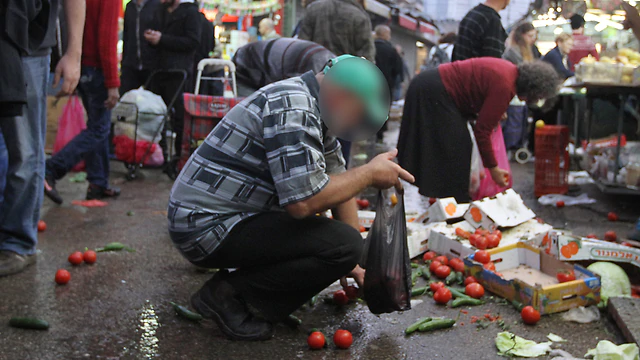A survey conducted in the midst of Israel’s reopening plan finds that 40% of the people are having trouble paying for basic expenses while requests for welfare have increased by 50%.

Israel Poor people collect food from the ground in Carmel Market in Tel Aviv (Photo Ido Erez, Ynet News)
A survey conducted in the midst of Israel’s reopening plan finds that 40% of the people are having trouble paying for basic expenses while requests for welfare have increased by 50%.
The survey, conducted by The International Fellowship of Christians and Jews (The Fellowship) and the Geocartography Institute, analyzed the answers of 600 Jewish and Arab participate, as a representative sample of the population.
“The social and economic impact of the pandemic has been a devastating crisis,” said Yael Eckstein, President, and CEO of The Fellowship.
- According to the survey:
About 40% responded that they are facing difficulties in paying for basic expenditures.
24.7% of survey participants were put on unpaid leave or dismissed from their jobs
14.1% of the couples both lost their income.
21% of the participants stated that they lost half or more of their household income.
24.7% said their income was not affected at all. 9.6% are having trouble buying food.
9.3% said they have difficulty paying their mortgage or rent
8.6% report having trouble paying bills such as electricity, water, gas, and municipal taxes.
10% said that they are in danger of being evicted from their homes or having their electricity or water turned off.
25.4% need economic assistance from their family or friends.
Over 10% will have to return or have already returned to live with their parents because of the crisis.
However, 42.6% cannot depend on their family or friends for help.
About 13% are getting assistance or will soon be asking for assistance in the near future from social service departments or non-for-profit organizations.
30% expect that it will take them more than six months to recover from the economic crisis.
“We see an increase of 50% in new requests made to local social service departments. We expect that the economic difficulties will only get worse,“ said Tami Barsheshet, chairperson of the organization of social service managers. “Having members of a family dismissed from their jobs or put on unpaid leave creates an economic crisis that affects the whole family.”
The Fellowship is giving away aid of 700 NIS (about $200) to purchase medication, food, baby care supplies, and clothing, to approximately 2,700 families that have contacted local social service departments for help.
Read more about: the International Fellowship of Christians and Jews (The Fellowship)



